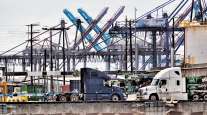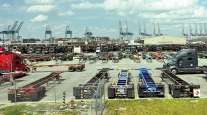DCLI to Raise Chassis Fees; Trucking Response Mixed

This story appears in the Dec. 5 print edition of Transport Topics.
Direct ChassisLink Inc. will raise daily chassis rates it charges trucking companies to haul containers from ports in the Southeast, Gulf Coast and Midwest beginning Dec. 15, following similar increases from Trac Intermodal and Flexi-Van Leasing Inc. this summer.
DCLI will raise rates 50 cents in the Southeast and Gulf Coast to $19 and $19.50, respectively, and 75 cents in the Midwest to $20.
“This increase reflects further investments into enhancing our chassis offerings, including acquiring brand-new chassis and equipping portions of our fleet with radial tires and upgraded LED lighting. DCLI remains committed to providing the youngest, highest-quality and safest chassis on the road,” the company wrote in an announcement to trucking companies.
A spokesman for DCLI declined to comment to Transport Topics about specific investments or the number of new chassis it will purchase.
Trac wrote in a June notice that it would use the additional revenue to modernize the chassis fleet, improve maintenance services and offer high-quality road service for breakdowns. Flexi told customers in June that it would invest in “customer facing systems” to continue to provide good service.
DCLI said chassis fees in the Northeast, Pacific Northwest and California will not change.
Curtis Whalen, executive director of American Trucking Associations’ Intermodal Motor Carriers Conference, said he’s not surprised by the increase and that he hasn’t received complaints from motor carriers.
“It’s been a tough year for the chassis providers, particularly with the Hanjin situation creating a disruption in the supply chain. So the modest rate increases are not particularly startling, and I think it’ll be put to good use,” he said, referring to the bankruptcy of South Korean container liner Hanjin Shipping Co. in August.
Ken Kellaway, president of RoadOne IntermodaLogistics, said that he supports upgrading equipment because higher-quality chassis will improve road safety, equipment reliability and transportation efficiency.
“The industry cannot afford to have older assets in the system any longer in order to keep pace with the ever- increasing demand for equipment fluidity and the regulatory pressure for safety and hours of service,” he said. “The key is that the shipping community needs to support the drayage community in compensating for these increased rates.”
Other trucking companies, however, are frustrated with the frequent rate hikes, and they’re formulating alternatives to address the issue.
For example, the North American Chassis Pool Cooperative said it hasn’t increased rates since 2013. The pool leases chassis near ports in Savannah, Georgia, Houston, New Orleans, Charleston, South Carolina, and Wilmington, North Carolina, in addition to inland locations. However, the cooperative doesn’t have a presence at ports in Southern California, New York-New Jersey or the Pacific Northwest.
“With each increase by the other chassis providers, the value of NACPC’s contribution to the market is enhanced and more pressure is placed on the steamship lines to allow 100% motor carrier choice when the motor carrier is paying for the chassis,” said Dave Manning, president of NACPC and Nashville, Tennessee-based trucking company TCW Inc.
Mark George, IMC Cos. chairman, said his trucking companies primarily use the chassis pool but also rely upon the other big three chassis providers based on the ocean carrier. George also is vice chairman of NACPC.
“IMC Cos.’ ocean carrier clients are losing money and looking for cost-saving opportunities. They are typically not affording rate in- creases,” he said. “If ocean carriers would support ‘motor carrier choice,’ then chassis provisioning costs would decrease instead of increase.”
IMC ranks No. 80 on the Transport Topics Top 100 list of the largest U.S. and Canadian for-hire carriers.
There also is a new trend among trucking companies to buy their own chassis to haul containers, partic- ularly in Southern California, according to Golden State Express President Fred Johring.
“[It’s] driven more by the lack of pool chassis availability than costs. But, of course, as rates increase, so will the infusion of private chassis,” he said.
“In our case, we run at least half of our moves on private chassis now,” Johring added. “On the balance of the moves, we have failures every day caused by lack of pool chassis, and steamship lines take no respon- sibility. So if there are no chassis available, and the free time has expired at the terminal, the client has no choice but to pay [extra fees].”




